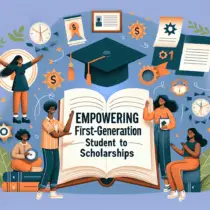Breaking barriers in education is a crucial step towards creating a more equitable society. For first-generation students, the path to higher education can be filled with challenges, including financial barriers. Scholarships play a vital role in helping these students achieve their academic dreams by providing financial support to cover tuition, books, and other expenses.
Finding scholarships specifically tailored to first-generation students can be a daunting task, but with the right resources and strategies, it is possible to secure funding for college. In this article, we will explore how first-generation students can break through financial barriers and access scholarships that can make their educational aspirations a reality.
**Researching Scholarships for First-Generation Students**
One of the first steps in finding scholarships for first-generation students is to conduct thorough research. There are many scholarship opportunities available for students who are the first in their families to attend college, but these opportunities may not always be widely publicized.
Start by checking with your school’s financial aid office or guidance counselor for information on scholarships specifically geared towards first-generation students. Many colleges and universities offer scholarships specifically designed to support these students on their academic journeys.
Additionally, online scholarship databases such as Fastweb, Scholarships.com, and College Board’s Scholarship Search can be valuable resources for finding scholarships tailored to first-generation students. These databases allow you to search for scholarships based on your background and interests, making it easier to find opportunities that are relevant to you.
**Applying for Scholarships**
Once you have identified potential scholarship opportunities, it is crucial to carefully review the application requirements and deadlines. Many scholarships require essays or personal statements outlining your educational goals, career aspirations, and why you are deserving of the scholarship.
When writing these essays, be sure to highlight your unique experiences as a first-generation student and how receiving the scholarship would help you overcome financial barriers and achieve your academic goals. Personalizing your application can make you stand out from other applicants and increase your chances of securing funding.
In addition to essays, many scholarships may also require letters of recommendation from teachers or mentors who can speak to your academic achievements and character. Be sure to give your recommenders plenty of time to write these letters and provide them with any necessary information about the scholarship requirements.
**Seeking Community Organizations**
Community organizations and non-profit groups often offer scholarships specifically aimed at supporting first-generation students in their pursuit of higher education. These organizations may have more localized scholarship opportunities that are not widely advertised through traditional channels.
Research local community organizations in your area that focus on education or youth development and inquire about any scholarship programs they may offer for first-generation students. These organizations may also provide additional support services such as mentoring programs or college readiness workshops that can further assist you in navigating the college application process.
**Utilizing Government Resources**
Government agencies at the federal, state, and local levels also offer various forms of financial aid that can help first-generation students pay for college. The Free Application for Federal Student Aid (FAFSA) is a key resource for accessing federal grants, loans, and work-study programs based on financial need.
State governments may also provide grants or scholarships specifically targeting disadvantaged or underrepresented populations such as first-generation college students. Be sure to research available state-based financial aid programs that you may qualify for based on your background and academic achievements.
**FAQ about Finding Scholarships for First-Generation Students**
Q: How do I know if I am considered a “first-generation” student?
A: First-generation students are typically defined as those whose parents did not attend college or complete a degree program. If neither of your parents have earned a bachelor’s degree or higher, you are likely considered a first-generation student.
Q: Are there any specific scholarships available only to first-generation students?
A: Yes! Many colleges, universities, community organizations, and government agencies offer scholarships specifically tailored towards supporting first-generation students in their pursuit of higher education.
Q: What should I include in my scholarship application essay?
A: When writing your scholarship application essay, be sure to highlight your unique experiences as a first-generation student, your academic achievements, career aspirations, and why receiving the scholarship would make a significant impact on your educational journey.
In conclusion breaking barriers by finding suitable scholarships is essential towards achieving educational goals among First-Generation Students Thank You!






